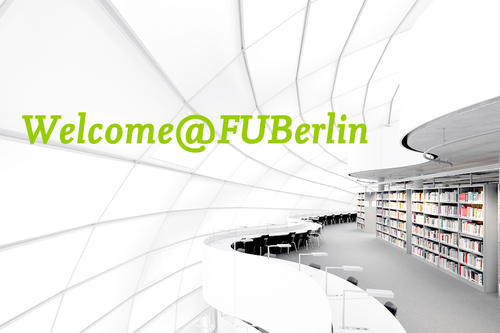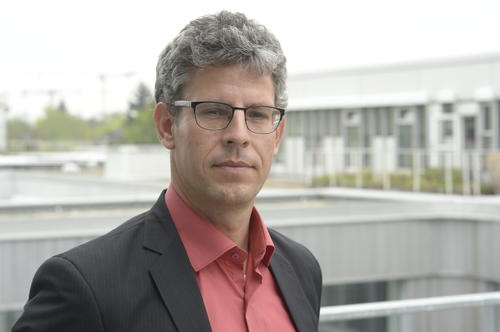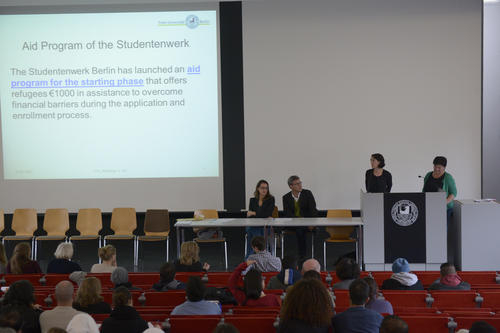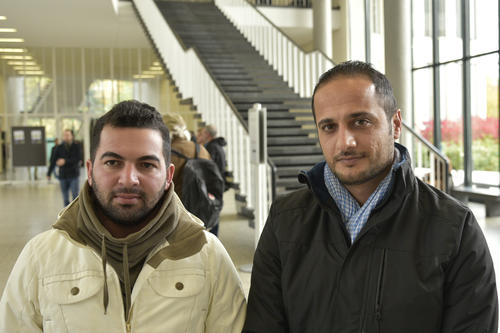Welcome Program of Freie Universität Is Enthusiastically Received
The Welcome to Freie Universität Berlin program – a range of offerings for refugees interested in studying in Germany – was launched in October.
Dec 08, 2015
The goal of the Welcome to Freie Universität Berlin program is to provide people who have fled crisis areas with easier access to the university.
Image Credit: Freie Universität Berlin
Florian Kohstall, head of the Liaison Office of Freie Universität in Cairo, coordinates the program together with Stefanie Böhler from the International Office.
Image Credit: Bernd Wannenmacher
Around one hundred refugees interested in studying at Freie Universität made their way to the Henry Ford Building to learn more about the program.
Image Credit: Bernd Wannenmacher
Ibrahim (left) and Amin attended the information session in October. Thirty-year-old Amin wants to continue his studies, which he began in his native Syria.
Image Credit: Annika Middeldorf
Around one hundred refugees are already participating in the selected seminars, German courses, and the buddy program offered by Freie Universität as part of the Welcome to Freie Universität Berlin program. The aim of the program is to provide refugees who wish to study at Freie Universität with easier access to the university.
When the Welcome to Freie Universität Berlin program was presented in mid-October, it met with considerable interest. More than one hundred refugees who are considering studying in Germany made their way to the Henry Ford Building on Freie Universität’s campus to learn more about what the program has to offer and to get answers to a variety of questions: Can I get credit for work done at my home university? How good does my German have to be to study? Can I start going to seminars immediately?
Access to Seminars and Lectures
Starting in the current winter semester, refugees have been able to participate in selected courses at Freie Universität for free. Around fifty refugees are already taking advantage of the offerings at the university’s various institutes. Approximately one hundred courses are open to them in the Department of Biology, Chemistry and Pharmacy, the Department of Mathematics and Computer Science, the Department of Physics, the Department of Political and Social Science, and at the John F. Kennedy Institute for North American Studies. The course offerings are being continually expanded and can be viewed online.
“There is a great willingness on the part of the individual departments and among lecturers to participate in the program,” says Florian Kohstall, director of the Liaison Office of Freie Universität in Cairo. Kohstall, who holds a doctorate in political science, is coordinating the Welcome to Freie Universität Berlin program together with Stefanie Böhler from the university’s International Office. From the 2016 summer semester onward, the university plans to make it possible for participants in the program to take courses that can be credited to a subsequent degree program. “With these offerings we want to reach people who would like to begin a regular degree program at our university in the future,” says Kohstall.
In an additional course entitled “Introduction to Living and Studying in Berlin,” the newcomers learn important facts about Germany. The course is taught in English and focuses on the country’s cultural, historical, social, and political development in the international context. Information is also provided on university studies and professional life. Thirty refugees are currently attending.
Learning German for Everyday Life and University Studies
Because German language skills are a key requirement for studying in Germany, Freie Universität has set up special German courses for refugees. Sixty have signed up for these intensive language courses so far. They are offered free of charge, take place four days a week, and are directed at students and prospective students who do not have sufficient German language skills to begin their studies. They run over a total of sixteen weeks and are divided into three successive modules.
Language is also the focus of additional initiatives and offerings of the Welcome to Freie Universität Berlin program. For example, Freie Universität’s Language Center holds office hours in Arabic, English, and German for refugees who need assistance with university-related formalities. Arabic teachers have organized a workshop for members of the university community who are involved in assisting refugees. The workshop includes an introduction to the Syrian dialect, a variant of High Arabic. An additional offering is a one-day workshop in which volunteers learn the basics of German teaching.
Volunteering: The Buddy Program
Not even six weeks after the program’s launch, members of the university have shown great commitment to the volunteer activities organized by the Welcome to Freie University Berlin program. Fifty individuals have registered for the Buddy Program alone, in which students and employees of Freie Universität help out in various ways, whether as conversation partners for German learners, by explaining basic aspects of university studies and the structure of the programs in individual subjects, or by giving guided tours of the campus and important university institutions, such as libraries.
The university is planning an additional information event for refugees in 2016. Florian Kohstall expects that demand for the program will continue to grow in the coming months. As he says, “Some of the refugees are still very busy with basic administrative matters. They can easily spend several days a week visiting the authorities. It’s hard to go to the university regularly under such conditions.”
Applying Online
Anyone interested in participating in the Welcome to Freie Universität Berlin program can apply online. Prospective students must demonstrate that they have already registered as refugees in Berlin and have a higher education entrance qualification from their home countries. Prospective students who wish to apply for a regular degree program are encouraged to seek out the comprehensive counseling services of the Info-Service, which has long provided information and advice to refugees and asylum seekers.
From the 2016/2017 winter semester onward, the Studienkolleg – a one-year school-like preparatory program – is expected to offer additional slots for prospective students who are ineligible to apply for admission to a German university because they lack the necessary higher education entrance qualification from their home countries. “Certain Syrian high school diplomas are recognized as the equivalent of Germany’s Allgemeine Hochsulreife [general higher education qualification], but in many cases we will need to take a closer look at what credits we can award for previous coursework and qualifications,” says Florian Kohstall. “Integrating people who have been forced to leave their home countries is an enormous challenge, even for universities, but you can sense the great willingness to cooperate among everyone involved. The same applies to the many unresolved issues that are currently being addressed at the federal and state levels.”




